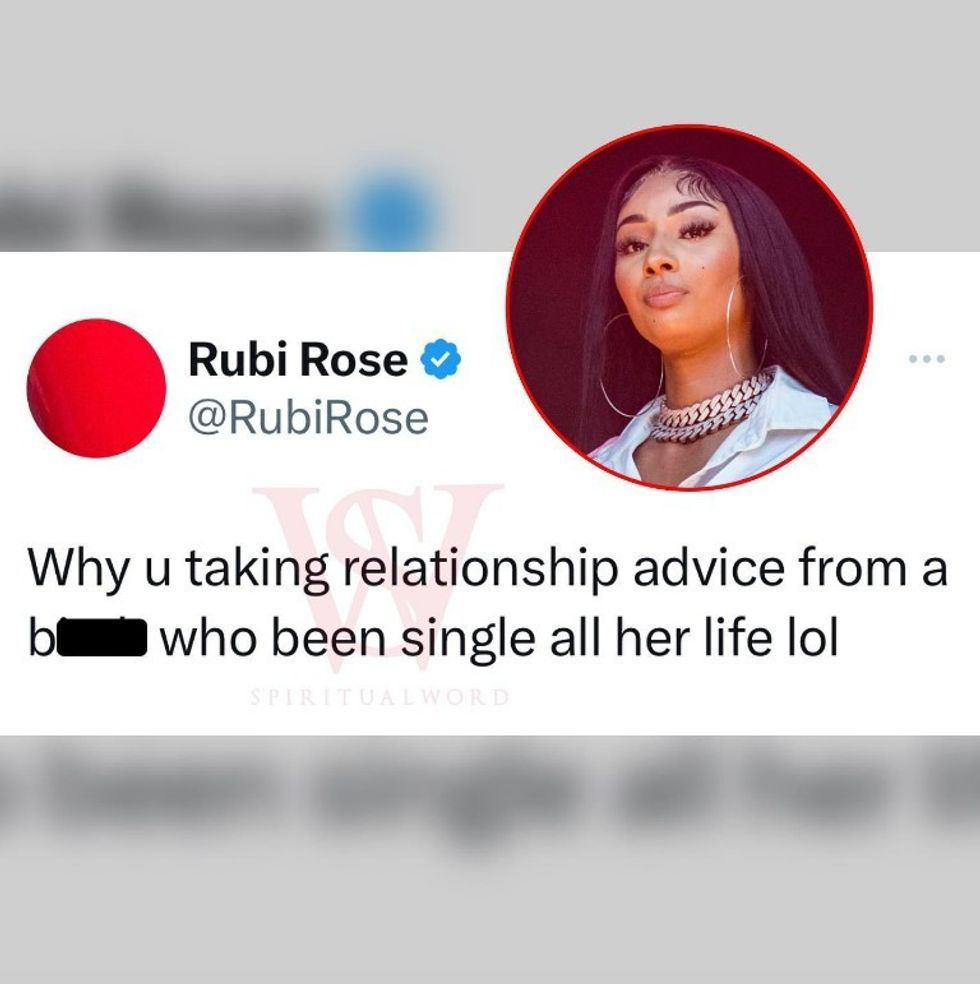
It never fails. Even though I’ve been writing on relationships for well over two decades at this point and have been counseling couples (especially married couples) for about 17 years now, at least once a week, someone will ask me what qualifies me to be an expert being that I’ve never been married before and I don’t have any children.
Well…when it’s church folks who try to come at me with their cynicism, I’m quick to remind them that out of the three biblical characters who spoke the most on marriage in the Bible — Moses, Christ, and Paul — only one of them was actually married when they did (Moses). Plus, humans don’t need other humans to qualify them for a particular purpose or calling in life; that’s God’s job.
Okay, but what do I say to all of the other people from other walks of life who seem to think that their similar line of questioning is somehow supposed to stump/trump me or something? That’s a really great question, especially since it’s been widely reported that by the year 2030, 45 percent of women will be single and childless in this country. That’s a lot of single voices out here. That’s why I thought it might be helpful to share some food for thought for other single women who may have folks who try and challenge them in this department too.
If you happen to be a single woman and a part of you is either hesitant to speak up whenever the topic of relationships comes up, or you’re not sure what to say when you see (or read) social media posts that say, for example, “If you’re not married, you don’t need to be talking about marriage” — here are a few things that can definitely checkmate some of the skeptics who are in your wake.
Never Forget What Singleness Means
 Giphy
GiphyBack in 2019, two articles that I wrote for the platform are “10 Words That'll Make You Totally Rethink The Word 'Single'” and “10 Bona Fide Benefits Of Being Single.” There are two (main) reasons why I did so — one is because I think it’s always important to remember that each relational status has some major benefits to it, and two, chile, if you only knew the number of married folks who tell me that they wish they had embraced and hell, even respected their singleness prior to saying “I do”…it’s more people than not at this point.
Indeed, although marriage is a beautiful thing, in life, it is not the ONLY thing. Not only that, but the daily sacrifices that must be made in order to keep a marriage thriving? Those are things that single people never have to worry about. And listen, if marriage was the “end all to be all” for this world, the Most High could’ve come up with a way for us to get married sooner than most of us do (or even should).
Singleness isn’t a deficit or even a consolation prize. For starters, just look at some of the words that are used to define it (definitions) along with others that are directly associated with it (synonyms): distinct from other things, unique, original, special, exclusive, exceptional, peerless, rare, undivided, unrivaled, uncompounded and unusual.
Hmph. I don’t know about y’all, but personally, I would have no problem with people who are defined that way speaking into my life. Just saying. #Elmoshrug
Have You Checked Out the Divorce Stats Lately?
 Giphy
GiphyOur culture can be weird as hell sometimes. Like, why is it that so many people want to low-key shame singles out of offering up insights, perspectives, and even pearls of wisdom on relationships, yet divorced people aren't challenged in the same way? Because while single folks may have never been married before (I count “single” the way the IRS does: single until married, and technically, divorced people are classified as being “divorced” because, again, Uncle Sam), divorced means that two people were, for whatever the reason, unsuccessful at making their marriage work — so that sounds like they aren’t exactly experts either.
And being that the divorce rate for first-time marriages is still about half (although some studies say that it’s between 40-50 percent these days) and the rate for second and third are significantly higher — I never got why being divorced vs. choosing to not get married so that there’s no way that you can end up divorced, seems to earn more credibility. Who came up with that? Divorced folks?
It actually reminds me of a divorced aunt who tried to be slick and say to me several years ago, “How are you out here getting paid to talk about marriage when you’ve never experienced it before?” I mean, we share the same DNA, so I don’t know why she thought I wasn’t gonna “return the serve”: “I would prefer to never be married than be a divorce statistic. You’re one…right?”
Listen, when it comes to divorce, sometimes ya live, and ya learn and I have had many conversations with people who happen to fit into that demographic and have had some profound words to share, no question. Yet when it comes to actually believing that divorced people have more credibility, there are two things to keep in mind.
One, as someone who has been working with married and divorced people for almost two decades now, you’d be amazed how many individuals from both demographics say that they took a lot for granted while they were single. Not only that, but they wish that they had paid more attention to what their gut warned them about before becoming a husband or wife. In other words, many have said that they had a lot of relational insight when they were single…they just ignored it.
And two, if I were to compare singles to divorced folks, I would use studying a test vs. taking a test to further illustrate my point. Don’t assume that just because someone has never taken a test before that they have not studied, sometimes ad nauseam, the content that’s on it. And, at the same time, sometimes the ones who already have — taken the test, that is — and were unsuccessful at passing, they ended up in that situation because they didn’t prepare as much as they should’ve.
Because, let us not forget (or ignore), that the ultimate goal when it comes to being in a relationship is not just “being in one” — all of us can do that. No, the key is to be in a healthy relational dynamic. People who are learning, striving, and respecting what it takes to be in those? That’s who we should be taking heed from.
This brings me to my next point.
Wisdom, Knowledge and Discernment Do Not Relationally Discriminate
 Giphy
GiphyAn artist and author by the name of Tamara Kulish once said something that I rock with wholeheartedly: “Everyone is my teacher. Some I seek. Some I subconsciously attract. Often, I learn simply by observing others. Some may be completely unaware that I’m learning from them, yet I bow deeply in gratitude.” I like this because it amplifies the fact that when you are truly serious about and committed to becoming the best version of yourself, you appreciate wisdom and knowledge in any form that it comes.
That said, there are countless married and even boo’d up couples who tell me that I continue to offer up ways of looking at relationships that they have never considered before, even though they are in a relationship, and a huge part of the reason is that I study the topic. I am literally a student of marriage (no joke). The number of books that are in my possession, articles, podcasts, and links that I have bookmarked, Scriptures that I have analyzed — you have no idea. Plus, being single, even if/when you go by my definition, which again is “never been married before,” doesn’t mean that you don’t know about relationships at all.
I’ll give you another comparison: back when I was in these streets, as far as sex goes, you have no idea how much foresight, intelligence, and basic common sense I received from virgins — that’s because, just because they never had sex before, that didn’t mean they didn’t know a thing or two about self-worth, avoiding temptation and waiting for what was right instead of settling for what was around. I would’ve been an idiot to write them off on some, “Girl, if you’ve never had sex before, you can’t talk to me about sex.” They might not know how to fully address the actual act (I frame it that way because many virgins are that on a technicality; they’ve done something before), yet they can definitely help me to think about some things that will help me to make wiser sexual decisions.
Single people are no different when it comes to marriage (or serious long-term relationships) — believe you me, you get a hold of the right single folks, and they can give you plenty to think about as they offer up a myriad of seeds to give you some “ah-ha moments” that can do you some real good. It reminds me of something that my mother used to say: “Discernment prevents experience from being your teacher.” Some of the wisest people in their world are ones who don’t believe that they have to go through something in order to be insightful about it.
Case in point. As a doula, sometimes when I’m being interviewed, and I give advice on some parenting-related matters, a person will say, “How do you know all of this if you’ve never had a child before?” More times than not, my immediate response is, “I’ve never been a mom. Oh, but I’ve been a child. You’d be amazed how much I remember about that time in my life.” (Plus, I used to be a teen mom director for the local chapter of a national non-profit). And honestly, sometimes that’s what I tell people about being a marriage life coach too. Chile, your mind would be blown to sit at the feet of child/adult child survivors of their parents’ divorce…but that’s another topic for another time.
The point that I’m trying to make with this particular point is wisdom is about applying knowledge with mature judgment; knowledge is about obtaining facts, truth, and principles through various forms of study and investigation, and discernment, by definition, is about judging matters, wisely, with a heightened level of understanding.
Now, based on the meanings of these three words…sounds to me like anyone who says that a single person can’t enter the relationship discourse with their own level of wisdom, knowledge, and discernment is pretty ignorant of what those words actually mean. Therefore, they should probably start there. #Elmoshrug
You Are a Voice in This World
 Giphy
GiphySomebody really needs to give actor and singer (because she really can sing her ass off) Tisha Campbell her flowers because she really has been a part of some of the most classic moments in Black culture — including the time when she had a guest role in, what continues to be one of the most iconic television sitcoms of all time: A Different World. The real ones will remember when she played a young woman by the name of Josie who had HIV. During a particular scene where she shared her story, her professor (Whoopi Goldberg) said to her, “You are a voice in this world.”
Now imagine how ridiculous someone would sound to say that Josie doesn’t need to speak about relationships because she chose not to date because of her condition. Josie had a TON of insight because she saw life from a perspective that a lot of people didn’t have — and if they respected that, what she offered up was priceless. Yes, she was a voice in this world. And a powerful one at that…so much so that I still remember that episode to this day and (lawd) that was 32 freakin’ years ago.
Even with as much daily and consistent work as I do in the realm of marriage, of course, I would be quite arrogant and presumptuous to think that some things do not come via experience; that as I am sharing wisdom and knowledge on the topic with various married people, they are teaching me as well, just by being a husband or a wife. And divorced folks, at the very least, they can speak on what not to do. At the same time, though, no one is capable of silencing my own voice just because of my chosen relational status.
If anything, the ones who aren’t parroting what they hear others say, they have applauded me for taking what I have learned seriously enough to treat marriage as sacred enough to wait until it's right…for me. That move alone has caused them to honor the voice that I have…in this world.
So single ladies, don’t worry about the haters. Humble people who want to grow get that this world is a school and everyone is a teacher in it. Houseless people (what I call “homeless” ones) can give insights on finances. Substance abusers can give insight into sobriety. Atheists can give insight into religion. People without kids can give insight into parenting. Women can give insight into men. Men can give insight into women.
And yes, single people can give insight into marriage and relationships.
You are a voice in this world.
With the help of wisdom, knowledge, and keen discernment, make sure that you do.
Let’s make things inbox official! Sign up for the xoNecole newsletter for daily love, wellness, career, and exclusive content delivered straight to your inbox.
Featured image by zusek/Getty Images
This Is How To Keep 'Holiday Season Stress' From Infecting Your Relationship
Hmph. Maybe it’s just me, but it seems like there is something really weird happening in the fall season air (because winter doesn’t officially begin until December 21) that cuddle season is in full swing while break-up season is as well. In fact, did you know that break-ups are so popular during the holiday season that December 11 is deemed Break-Up Day?
The reasons why relationships shift around this time vary; however, I did both roll my eyes and chuckle when I read that a very popular one is because it’s an easy way to get out of getting one’s significant other a Christmas present. SMDH.
Anyway, I personally think that the less shallow folks out here may contemplate calling things “quits” or they at least distance themselves a bit from their partner (and what I’m referring to is serious relationships) due to all of the stress and strain that oftentimes comes with the holidays whether it be financial, familial, due to their tight schedules or something else.
Listen, I would hate for you and your man to miss the fun and happiness of experiencing this time of year, all because you are so overwhelmed or irritated that you can’t really enjoy it. That’s why I have a few practical tips for how to avoid allowing the typical holiday season stress from INFECTING your relationship.
Manage Your Expectations
 Giphy
GiphyUnmanaged expectations. If there is a main reason why the holiday season tends to be so stress-filled for so many people, I’d bet good money that this is the cause. And when you’re in a long-term relationship, expectations can manifest themselves in all sorts of cryptic and/or unexpected ways. You might have relatives who assume that you are going to be with them for Thanksgiving or Christmas when you have other plans in mind. You might be thinking that you are going to spend one amount for presents while your man is thinking something totally different. When it comes to scheduling, your signals may be crossed.
And you know what? To all of these scenarios, this is where clear and consistent communication come in. Don’t assume anything. Don’t dictate anything either. From now until New Year’s, mutually decide to check in once a week, just to make sure that you are both on the same page as it relates to the holidays and what you both are thinking will come along with it. The less blindsided you both feel, the less stressed out you will be. Trust me on this.
Set (and Keep) a Budget
 Giphy
GiphyOkay, so I read that last year, 36 percent of Americans incurred some type of holiday-related debt. Hmph. Last year, there was still some sense of normalcy in this country, chile, so I can only imagine what finances are gonna look like over the next several weeks. That said, since I don’t know a lot of people who don’t find being broke stressful, make sure that you and your bae set a budget and then stick to it this year — no ifs, ands or buts.
Because really, y’all — it doesn’t make sense to deplete savings and/or max out credit cards for a few days of giggles only to be damn near losing your mind because you don’t know how to make ends meet come Dr. Martin Luther King, Jr. Day.
And by the way, this tip doesn’t just speak to things like food and gifts; I also mean travel. If it doesn’t make a ton of sense (or cents) to be all over the place this year — DON’T BE.
Keep Matthew 5:37 at the Forefront
 Giphy
GiphyIf off the top of your head, you don’t know what Matthew 5:37 says, no worries, here ya go: “But let your ‘Yes’ be ‘Yes,’ and your ‘No,’ ‘No.’ For whatever is more than these is from the evil one.” That verse right there? Oh, it’s a boundaries lifesaver! I say that because do you see “maybe” or “I’ll think about it” in there? Nope. LOL. It says that you should tell people “yes” or “no” and leave it at that — and that complements Anne Lamott’s quote, “’No’ is a complete sentence” impeccably well. Yeah, you’ve got to remember that anything beyond a yes or no to a request is privileged information; you don’t owe anyone details or an explanation.
Besides, if you are really honest with yourself, when someone asks you something and you give a “Umm, let me think about it” kind of reply, more times than not, you already know what your answer is going to be — so why not let you both off of the hook? Give your response. Commit to that. And let everyone (including yourself) get on with their lives and schedules.
I promise you that when it comes to those holiday parties, you are pissing more folks off by not RSVP’ing or doing so and not showing up than just saying, “Thank you but not this year” off the rip.
Remember That Your Personal Space Is Privilege Not a Right
 Giphy
GiphyA friend of mine recently bought a new house and invited me over to come see it. He’s a single man with no children, so as I was taking in all of the space that he had, especially as I walked through his finished basement, I joked about relatives coming to live with him. “Hell no” and “absolutely not” were pretty much his immediate responses as he went on to say that some folks even had the nerve to be offended when he told them that he had no intentions on taking DNA in.
Ain’t it wild how people think that your stuff is their right? And yes, that brings me to my next point. Your home is your sanctuary space. If you want to host folks this year — cool. If not, ALSO COOL. Please don’t let folks (family included) guilt you into how they want you to act or even into what they would do if the shoe was on the other foot. You are not them — and as one of my favorite quotes states, “If two people were exactly alike, one of them would be unnecessary.” (A man by the name Larry Dixon said that.)
Hell, my friends? They know that I am good for sending them random things that they need or even want all throughout the year. Coming over to hang out at my pace, though. Uh-uh. Chalk it up to being a card-carrying member of the ambivert club yet I like keeping my living space personal — and I sleep like a baby, each and every night, for feeling that way.
Always remember that your space, your time, your resources, your energy and shoot, yourself period (including your relationship), are all things that are your own. You get to choose how, when and why you want to share them. The holiday season is certainly no exception.
Cultivate Some “You Two Only” Traditions
 Giphy
GiphyIt’s not uncommon for some couples to hit me up after the holiday season to “detox.” Sometimes it’s due to the financial drama (and sometimes trauma) that they experienced. Sometimes it’s because they allowed their relatives (especially in-laws) to get more into their personal business than they should’ve. More than anything, though, it tends to be because they didn’t get enough quality time together and so ended up feeling “disconnected.”
Please don’t let that happen. Listen, I’m not even a holidays kind of woman and yet, I will absolutely sit myself down with some hot chocolate and chocolate chip cookies to enjoy a Hallmark holiday film or two. Aside from the fact that most of them are lighthearted and sweet, I also like that they usually focus on couples loving on each other amidst all of the holiday beauty and ambiance — which is something that all couples should set aside some time to do.
Maybe it’s a vacation. Maybe it’s a staycation. Or maybe it’s my personal favorite, A SEXCATION. Whether it’s for a few days, the weekend or even overnight — don’t you let the holidays go by without setting aside time for you and your man to celebrate one another. Don’t you dare (check out “Are You Ready To Have Some Very Merry 'Christmas Sex'?”).
GET. SOME. REST.
 Giphy
GiphyI once read that 8 out of 10 people get stressed out over the holidays and 3 out of 10 lose sleep during to it — and when you’re stress-filled and sleep-deprived, that can absolutely lead to hypersensitivity, making mountains out of molehills and even not being in the mood for sex.
Your relationship can’t afford to go through any of this, so definitely make sure to prioritize rest. I don’t care how unrealistic it might seem during this time, sleep should never be seen as a luxury; it will always and forever be a great necessity.
That said, try to get no less than six hours of shut-eye in (check out “6 Fascinating Ways Sex And Sleep Definitely Go Hand In Hand”) and even ask your bae to take a nap with you sometimes (check out “Wanna Have Some Next-Level Sex? Take A Nap, Sis.”). Not only will sleep help to restore your mind, body and spirit but, when it’s with your partner, it’s an act of intimacy that can make you both feel super connected, even in the midst of what might feel like chaos.
___
Holiday season stress is real. Still, never give it the permission or power to throw your relationship off. Put you and your man first and let the holidays be what they are gonna be, chile.
Let’s make things inbox official! Sign up for the xoNecole newsletter for love, wellness, career, and exclusive content delivered straight to your inbox.
Featured image by Shutterstock
It’s probably been over the past 2-3 years that I’ve become hyper-focused when it comes to applying certain chemical exfoliants known as acids to my skin. Personally, I’ve come to really appreciate ones like mandelic acid and hyaluronic acid because they have a way of softening my skin, brightening it up and really evening out my complexion overall.
In fact, on my skin, they have been so effective that they have caused me to wonder what would happen if I applied some of them to my hair too — and boy, was it an experiment that paid off big time!
If, while on your continual journey to get the best out of your own tresses, you’d like to learn how to get them healthier than it’s ever been, I’ve got seven acids that are typically known for skin use that can be just as beneficial to your hair as well.
1. Salicylic Acid
When it comes to your skin, salicylic acid is beta-hydroxy acid that is great for your skin if you’re looking for something that will exfoliate it, clear out your pores and dissolve dead skin cells. In fact, this is why it’s an acid that is quite popular when it comes to treating acne.
Your hair will enjoy salicylic acid because, if you’re looking to remove product build-up, you want to soothe an itchy or irritated scalp or you’ve got some dandruff flakes that are totally driving you up the wall, salicylic acid has the ability to treat all of this. Either purchasing a shampoo that contains this ingredient or adding it to your favorite scalp scrub is probably the most effective way to get the most out of it.
Just make sure that if your scalp is sensitive or dry that you approach with caution. In these instances, it could end up irritating your scalp more than helping it out, so use a very little bit in the beginning to make sure that it vibes with you.
2. Lactic Acid
Lactic acid is an alpha hydroxy acid that can help to even out your skin tone as well as slow down the signs of aging. The properties in it help to do this by reducing hyperpigmentation and boosting collagen production in your skin as well as keeping it hydrated.
Why is it great for your locks? For one thing, lactic acid is considered to be a humectant. This means that it pulls water from the air so that your hair is able to remain moisturized.
Another thing that makes it a winner is the fact that lactic acid breaks down dead skin cells on your scalp (so that your hair follicles are able to flourish), it can help to soften and detangle your hair (making it a helpful addition on your wash days) and it also helps to protect your tresses from heat styling tools and UV damage. Applying a hair rinse that’s made up of part lactic acid and part water can work wonderfully (so long as you apply it once a month, tops; more than that might be too “intense” for your hair strands).
3. Glycolic Acid
Glycolic acid is a water-soluble alpha hydroxy acid that is actually made from sugar. Your skin will adore it because it smooths the appearance of fine lines and wrinkles, improves the texture of your skin, gently exfoliates, clears your pores and brightens up your complexion overall.
The reasons why you should consider this acid for your hair is because it helps to keep your scalp youthful (and yes, there is such a thing; check out “Your Scalp Ages Six Times Faster Than Your Face. Why It Matters.”), removes excess sebum (that could be clogging up your hair follicles) and it helps to keep your hair moisturized. Your best bet here is to make it a part of your pre-shampooing ritual.
4. Succinic Acid
Succinic acid is an acid that is made from sugar cane and contains antimicrobial and anti-inflammatory properties. Although it doesn’t exactly exfoliate (like many of these other acids do), it can still be beneficial to your skin when it comes to reducing the kind of irritation that is associated with eczema, decreasing the bacteria that leads to breakouts and keeping your skin pretty hydrated.
As far as your hair goes, this is an acid that is worth trying out because it helps to balance the sebum that is on your scalp, remove dead skin and product build-up that can irritate your scalp and clog your hair follicles and, succinic acid is also beneficial when it comes to reducing dandruff and helping to prevent hair loss. Most people tend to apply this as a serum.
5. Hyaluronic Acid
I’ve officially sung the praises of hyaluronic acid on this platform before. One example is via the article, “Why Your Skin, Hair, And Nails Need Hyaluronic Acid Like...Yesterday.” On the skin tip, hyaluronic acid is great because it deeply hydrates your skin, contains anti-aging properties and can even bring relief to vaginal (including vulvar) dryness.
Your hair will adore this particular acid because it aids moisture to it (including your hair follicles), will help to improve your hair’s texture and it also soothes scalp dryness, nurtures the cuticles of your tresses and decreases frizz. Using a serum rich in this acid as a pre-poo or as a leave-in conditioner is recommended.
6. Azelaic Acid
If you’ve never heard of azelaic acid before, this is your lucky day. It’s a dicarboxylic acid that, when it comes to skincare (and hair care) products, is usually synthetic. Anyway, if you are looking for a way to reduce inflammation, even skin tone after a breakout or if you want to use an exfoliant that will improve the texture of your skin overtime, you might want to give this acid a shot.
This one makes the list as far as your hair is concerned because, if achieving more inches is your current focus, azelaic acid might come in handy. That’s because it is able to strengthen your hair, thicken your strands and also stimulate hair growth from within your hair follicles.
7. Glutamic Acid
Glutamic acid is actually a type of amino acid. Skin-wise, it’s great for deeply hydrating your skin as well as protecting it from pollutants and damaging UV rays. Also, if you’re looking for an acid that treats skin dryness or “tightness,” this could be the answer to your prayers.
Since glutamic acid is also considered to be a humectant, it’s another acid that can moisturize your hair. As a result, it can decrease breakage while helping your hair to feel smooth and look shiny.
BONUS: Amino Acids
Speaking of amino acids and hair, please try to keep some amino acids in your diet at all times. The reason why is because, since your hair is made up of mostly protein (keratin, to be exact), amino acids are pretty darn effective when it comes to helping you to maintain the overall health and well-being of your hair.
Ones to prioritize include proline (it boosts collagen so that your hair strands can maintain flexibility); arginine (it increases blood flow to your hair follicles so that they can receive the nutrients that they need); cysteine (it helps to keep your hair follicles healthy); alanine (it helps your system to produce more collagen), and isoleucine (it strengthens the tissues that help to make up your hair strands). All of these are available in supplement form or you can use Google to see which foods contain them.
___
Although it might initially seem odd to apply acid to your hair, as you can see, certain ones will work miracles for it. So, test them out to see which one tickles your fancy.
Hell, since they work for your skin as well — it’s a two-for-one deal that is worth every penny!
Let’s make things inbox official! Sign up for the xoNecole newsletter for love, wellness, career, and exclusive content delivered straight to your inbox.
Featured image by Shutterstock














